|
|
|
Sort Order |
|
|
|
Items / Page
|
|
|
|
|
|
|
| Srl | Item |
| 1 |
ID:
177596


|
|
|
|
|
| Summary/Abstract |
Most theories in the social sciences have intimations of both structure and agency, but in the English School (ES) corpus these appear in a particular way. While the ES is often considered a “structural theory”, in fact, the corpus is largely agentic in orientation. That is, the dynamic elements in ES accounts of international life are either collective or individual agents who hold institutional positions. They are states, state leaders, non-governmental organizations (NGOs), development officers, agency bureaucrats, and so on. Moreover, the agents are, themselves, constantly involved in creating, elaborating, reaffirming, or altering the institutional environments of their action. They are searching out institutional possibilities that will aid their specific objectives, in the process reaffirming them, while also creating or altering the structures within which they act. This points to the significance of structuring processes—successive actions that create stabilizing effects and whose effects have consequences for what follows. Agents acting within, and interacting with, institutions place the ES in a family relationship with the “new institutionalism” and, more specifically, with structuration theory.
|
|
|
|
|
|
|
|
|
|
|
|
|
|
|
|
| 2 |
ID:
177597


|
|
|
|
|
| Summary/Abstract |
The thought of the English School, and especially of Hedley Bull, on whose work this essay focuses, has often been regarded as somewhat conservative. Bull famously prioritised order over justice, offered a state-centric analysis of world politics focusing on ‘international society’, and favoured a ‘classical’ approach within IR theory (see Bull 1966; 2002); this reflected his underlying ‘middle-ground ethics’ (Cochran 2009).
|
|
|
|
|
|
|
|
|
|
|
|
|
|
|
|
| 3 |
ID:
177610


|
|
|
|
|
| Summary/Abstract |
This article analyses Chile’s foreign policy, utilizing a multilayered identity model, one that covers the country’s most stable identity layer as a sovereign state, an intermediate layer in which processes of identification between Chile and its peers unfold, as well as the most superficial layer in which key entrepreneurs advance new identities. Chile’s identity is examined through the lens of role theory, in order to unpack this country’s sense of being a misplaced state in South America. Chile’s role behaviour as a soft case of misplacement is triggered at the most superficial layer and partly permeates the intermediate layer of identity, despite the country’s historical experiences which have given rise to a sense of uniqueness in South America. Thus, this article shows how Chile’s role-play has tended to increase and/or offset its sense of misplacedness in South America in the period starting from 1990 and continuing into the new century.
|
|
|
|
|
|
|
|
|
|
|
|
|
|
|
|
| 4 |
ID:
177602
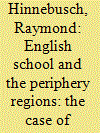

|
|
|
|
|
| Summary/Abstract |
The English School famously established the existence of an International Society. The first generation of ES scholars (Bull 1995) demonstrated, as against rationalist approaches such as realism, that IS matters for world politics and identified its dominant institutions, with sovereignty often seen as the master institution. Institutional change was chiefly addressed first in ES work on the export of Westphalian sovereignty to the non-Western world (Bull and Watson 1984) and later in debates over the impact of the global diffusion of Western ‘World Society’s’ liberal norms (eg, human rights) on sovereignty-centric IS. Notably, Buzan (2004) and his collaborators argued that, while a ‘thin’ sovereignty-centric IS had been globalized, regions retained distinctive packages of institutions resistant to normative homogenization
|
|
|
|
|
|
|
|
|
|
|
|
|
|
|
|
| 5 |
ID:
177601
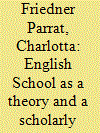

|
|
|
|
|
| Summary/Abstract |
It is becoming customary to define the English School (ES) as a group of scholars participating in a common inquiry related to a few central concepts, notably that of international society (Dunne 1998; Buzan 2001; 2004). Although the roots of the ES are often attributed to the British Committee on the Theory of International Politics (Dunne 1998; Vigezzi 2005; Navari 2009), it is now said to be more of an open society of impersonal ties rather than an exclusive community based on personal relations (Buzan 2004, 110–111). But how true is that assertion? If the School is theoretically open to anyone, why are its members predominantly male, white and Western?1 In this piece, we discuss three obstacles that prevent the ES from becoming a more inclusive venture.
|
|
|
|
|
|
|
|
|
|
|
|
|
|
|
|
| 6 |
ID:
177599


|
|
|
|
|
| Summary/Abstract |
Within the social sciences, there is growing interest in the ways in which cryptocurrencies are shaping interactions. The major approaches have been economic, sociological, legal, and technological. On the other hand, the international relations (IR) literature has been silent on the issue. This is striking as cryptocurrencies are considered to be a potential threat to dollar’s hegemony (Pierracini 2018), which has been credited as garnering the US economic and political advantages associated with its power position in international society (Strange 1987). Furthermore, private crypto-investments also stimulate debates on the denationalisation of currencies, which implicates the entire state-based architecture of Westphalian politics. Therefore, the emergence of cryptocurrencies could influence hegemonic cycles, diplomacy, and power distribution among states and between state and non-state actors.
|
|
|
|
|
|
|
|
|
|
|
|
|
|
|
|
| 7 |
ID:
177611
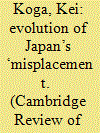

|
|
|
|
|
| Summary/Abstract |
This article argues that since the Meiji Restoration, the degree of Japan’s misplacement has changed, depending on its structural power and ability to shape the concept of ‘Asia’ as a region. More specifically, there are three historical turning points: first, from the Meiji Restoration to the Pacific War (hard misplacement); second, post-World War II to the end of the Cold War (soft misplacement); and third, post-Cold War to the present (relative well-placement). In each period, Japan was faced with a different concept of ‘Asia’ and attempted to modify its identity and roles accordingly. The degree of ’misplacement’ is thus not static, but elastic, and such a status is not a permanent attribute of the state. Changes occur when states undertake a role location process, particularly during or after a change in the regional environment.
|
|
|
|
|
|
|
|
|
|
|
|
|
|
|
|
| 8 |
ID:
177612


|
|
|
|
|
| Summary/Abstract |
Drawing on the layered model of identity change, this paper identifies three layers shaping South Africa’s foreign policy identity and how it is enacted through various roles. The most sedimented, fundamental layer least subject to change involves South Africa’s assertion of its sovereignty and its quest for legitimacy. The middle layer provides more exact demarcations between Self and Other, highlighting South Africa’s role in being a leader, mediator and bridge. Finally, the top, least institutionalized layer reveals that, although Pretoria is no longer subject to the hard misplacement of the apartheid years, South Africans’ sense of exceptionalism to the rest of the continent in the post-apartheid era and other Africans’ deep ambivalence toward South Africa, continue. The article highlights continuities and discontinuities between the apartheid and post-apartheid periods of statehood.
|
|
|
|
|
|
|
|
|
|
|
|
|
|
|
|
| 9 |
ID:
177598


|
|
|
|
|
| Summary/Abstract |
One of the great strengths of the English School (ES) has always been its expansive, sophisticated engagement with international relations history, which, unlike other IR approaches, is wedded to neither repetition (realism) nor teleology (liberalism, Marxism); it ‘lets the historical record speak for itself’ (Buzan and Little 2014, 59). The English School’s weakness with history has instead been Eurocentrism, epitomized in its narrative of the development in early modern Europe of the norms and practices of contemporary international society and their subsequent “expansion” out to the rest of the world through colonization and cultural imperialism (Bull and Watson 1984).
|
|
|
|
|
|
|
|
|
|
|
|
|
|
|
|
| 10 |
ID:
177604


|
|
|
|
|
| Summary/Abstract |
With the collapse of the Soviet Union in 1991, the study of IR went through a deep theoretical reconceptualization of its objectives, ethics, and raison d’être as a discipline. New popular and provocative perspectives, like Fukuyama’s vision of a Liberal world devoid of any ideological struggle, or Huntington’s view of a bleak global future of intractable cultural conflict, all epitomized the growing need for new theoretical lenses with which to tackle the complexity of the emerging international order at the time. The English School (ES), born in the fulcrum of the Cold War, yet profoundly marked by a rather traditional ‘European’ perspective on world affairs, saw an important reinvigoration in the early 1990s. Since then, the so-called ‘reconvening’ of the ES has helped establish the international society approach as one of the main theoretical perspectives in contemporary world politics. Despite its many accomplishments in resuscitating global-order concerns and historico-sociological agendas in IR, however, there are important areas which have remained unattended.
|
|
|
|
|
|
|
|
|
|
|
|
|
|
|
|
| 11 |
ID:
177595


|
|
|
|
|
| Summary/Abstract |
This forum includes some of the reflections on the English School (ES) offered in a two-day symposium at the University of St Andrews in October 2017, with the participation of almost thirty scholars. The symposium was structured around the theme ‘Is the English School still an underexploited resource in International Relations?’ - intentionally echoing Barry Buzan and Richard Little’s article, published in 2001, entitled ‘Is the English School an underexploited resource in International Relations?’ The goal of the symposium was to reflect on the position of the ES in the wider IR discipline, asking whether its ‘degree of exploitation’ has improved over the years or not.
|
|
|
|
|
|
|
|
|
|
|
|
|
|
|
|
| 12 |
ID:
177608
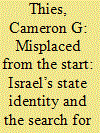

|
|
|
|
|
| Summary/Abstract |
This paper considers the elements that constitute Israel’s state identity, from its deepest layers of corporate identity through the middle layer of identification processes between self and other, to the most superficial layer at which political entrepreneurs are able to shape aspects of identity in the short term. Israel’s state identity is examined through the use of roles, alongside other elements of societal identity upon which it supervenes. Continuities and changes in Israel’s state identity are analyzed from independence in its geographic region through efforts to reimagine its cognitive region in the Mediterranean or Europe. While Israel is often frustrated in its inability to enact roles commensurate with its status in its geographic region, there is little agreement over what cognitive region this misplaced state really belongs in. For the moment, Israel remains a misplaced state in its geographic region.
|
|
|
|
|
|
|
|
|
|
|
|
|
|
|
|
| 13 |
ID:
177607
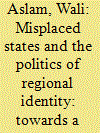

|
|
|
|
|
| Summary/Abstract |
Whilst there is no shortage of analyses on the politics of regions in International Relations, little attention has been paid to states who perceive that they do not properly fit in the regions they happen to be located in. These are the ‘misplaced states’: they stand out not so much because of material capacities but because they espouse an identity, manifested in different ways, in marked contrast to the states around them. This article asks what causes this process of a change in identity amongst misplaced states in different parts of the world. Comparing across regions, it analyses why and how states reconstruct their identities in order to enhance or deemphasise their degrees of regional conformity. By focusing on the ‘role-location process’ rooted in role theory, this article contributes to the literature by conceptualising the phenomenon of ‘misplacement.’ A state is misplaced when there is mismatch between its aspirations and others’ expectations for it. The article also details how and why misplacement occurs and studies its implications both for the states in question as well as for the politics of their geographical regions.
|
|
|
|
|
|
|
|
|
|
|
|
|
|
|
|
| 14 |
ID:
177609


|
|
|
|
|
| Summary/Abstract |
Pakistan has been a misplaced state from its birth. Created as a separate homeland for the Muslims of the Subcontinent, it considers itself to be a misfit in a multi-faith, South Asian region dominated by India. This paper analyses Pakistan’s misplaced identity utilising the layered model of identity change. The model helps us focus on various foreign-policy roles that Pakistan performs. The deepest layer (most resistant to change) denotes Pakistan’s identity as a sovereign and independent state, outlining the roles of an alliance partner and a nuclear power. The middle layer represents the identity of Pakistan as an insecure state with the roles of a ‘chancer’ state, a regional intermediary and the regional leader. The top (and least sedimented) layer points to Pakistan’s identity as a Muslim state, giving birth to the hoped-for roles of the leader of the Muslim world, an Islamic crusader, and the defender of the faith. However, Pakistan has been unable to gain acknowledgement for these roles either in South Asia or elsewhere. The country’s attempts to re-imagine a cognitive home for itself in the Middle East have also not come to fruition. It continues to be a misplaced state, cognitively dissociated from its geographic home.
|
|
|
|
|
|
|
|
|
|
|
|
|
|
|
|
| 15 |
ID:
177603


|
|
|
| 16 |
ID:
177606


|
|
|
|
|
| Summary/Abstract |
It gives me great pleasure to present to the readers of the Cambridge Review of International Affairs (CRIA) this special issue (entitled Misplaced states and the politics of regional identity) that forms CRIA’s Volume 33, Issue 4. The issue consists of a theoretical article and six case studies. The theoretical article introduces the phenomenon of ‘misplaced statehood’ while the cases of Israel, Pakistan, Chile, Japan, South Africa and Brazil examine its manifestations in international politics.
|
|
|
|
|
|
|
|
|
|
|
|
|
|
|
|
| 17 |
ID:
177614
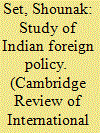

|
|
|
|
|
| Summary/Abstract |
A default great power by certain conventional metrics yet a developing state of the Global South, a young state with a legacy of an ancient civilization, one of the top ten economies yet home to the world’s largest number of poor people, and so on—these complexities and tensions inform India’s behaviour on the world stage which can range from the idiosyncratic to the iconoclastic. Three recent works on Indian foreign policy situate themselves along these lines and aim to address these puzzles. In doing so, they advance refreshingly novel perspectives on Indian foreign policy.
|
|
|
|
|
|
|
|
|
|
|
|
|
|
|
|
| 18 |
ID:
177605


|
|
|
|
|
| Summary/Abstract |
Twenty years ago, I called the English School (ES) an underexploited resource (Buzan 2001). Since then, a great deal has been done, and the ES can no longer be characterized as an ‘underexploited resource’. But that does not mean that nothing remains to be done. Opinions no doubt differ about what the priorities for the ES should be, but here are my three choices, and the reasons for them.
|
|
|
|
|
|
|
|
|
|
|
|
|
|
|
|
| 19 |
ID:
177613
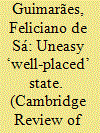

|
|
|
|
|
| Summary/Abstract |
In this paper, we argue that the Brazilian diplomatic discourse portraits an uneasy sense of ‘well-placement’ within both Latin America and the West. On the one hand, Brazil’s diplomatic narrative indicates an aspiration to belong to the West, yet without denying Brazil’s credentials as a developing or Third World country. On the other hand, Brazilian diplomats perceive Brazil as a Latin American country without denying its unique inheritance of Portuguese colonialism, a notion that somewhat dismisses Brazil’s linkages with Latin America’s main cultural traits. We show that this uneasy sense of ‘well-placement’ can be observed in Brazil’s complex identity-set, which is composed of three overlapping and contradictory layers of identity. The first layer is comprised of profound and firmly embedded identities created by regional and historical references, such as the Portuguese-Brazilian identity and Americanism. A second, less entrenched layer involves identities related to the foreign policy concept of autonomy created in the 1950s and 1960s. The third layer includes contemporary role conceptualizations, such as ‘emerging power’ and ‘regional leader.’ This complex identity-set shows Brazil’s contradictions concerning its place in the world, but arguably not the profound cognitive dissonance within its region and cultural affinities that tends to characterize Misplaced States.
|
|
|
|
|
|
|
|
|
|
|
|
|
|
|
|
| 20 |
ID:
177600
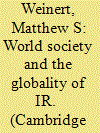

|
|
|
|
|
| Summary/Abstract |
Diogenes the Cynic famously declared that he was a kosmou politês—a citizen of the world. No doubt a radical proposition as much for ancient as it is for modern ears, Seneca understood the claim not as erasing local sources of identity, political action, and ethical obligation, but as enriching them and, importantly, constraining their worst manifestations, since our common humanity requires that we not injure ‘its fundamental ingredients’ of reason and moral choice. As such, the kosmou politês ‘is the ancestor and source of Kant’s idea of the “kingdom of ends” ‘which enjoins us ‘to treat with equal respect the dignity of…every human being’ (Nussbaum 2002, 7–8).
|
|
|
|
|
|
|
|
|
|
|
|
|
|
|
|
|
|
|
|
|